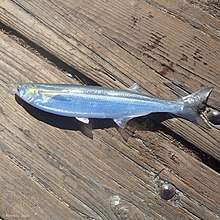Jack silverside
Atherinopsis californiensis, the jack silverside or jacksmelt,[2] is a species of neotropical silverside native to the Pacific coast of North America from Oregon, United States to southern Baja California, Mexico. This species grows to 45 cm (18 in) in total length and is important commercially as a source of human food. It is the only known member of its genus. The adults occur in inshore areas, such as bays. They form schools. This species is a demersal spawners in inshore habitats, it is oviparous and the larvae are planktonic, living at the very surface of the water and feeding on phytoplankton. The eggs are attached to one another and to the substrate by adhesive filaments in the chorion.[3]
| Jack silverside | |
|---|---|
 | |
| Scientific classification | |
| Kingdom: | Animalia |
| Phylum: | Chordata |
| Class: | Actinopterygii |
| Order: | Atheriniformes |
| Family: | Atherinopsidae |
| Subfamily: | Atherinopsinae |
| Tribe: | Atherinopsini |
| Genus: | Atherinopsis Girard, 1854 |
| Species: | A. californiensis |
| Binomial name | |
| Atherinopsis californiensis Girard, 1854 | |
Other common names
California smelt, blue smelt, horse smelt, peixe rey, pescado del rey, pesce rey, silverside
References
- Iwamoto, T.; Eschmeyer, W. & Smith-Vaniz, B. (2010). "Atherinopsis californiensis". IUCN Red List of Threatened Species. 2010: e.T183827A8183878. doi:10.2305/IUCN.UK.2010-3.RLTS.T183827A8183878.en.
- Leo Pinkas, California Marine Fish Landings For 1972 and Designated Common Names of Certain Marine Organisms of California, fish bulletin 161, Marine Resources Region, 1974
- Froese, Rainer and Pauly, Daniel, eds. (2019). "Atherinopsis californiensis" in FishBase. Aori 2019 version.
External links
- Froese, Rainer and Pauly, Daniel, eds. (2012). "Atherinopsis californiensis" in FishBase. June 2012 version.
![]()
